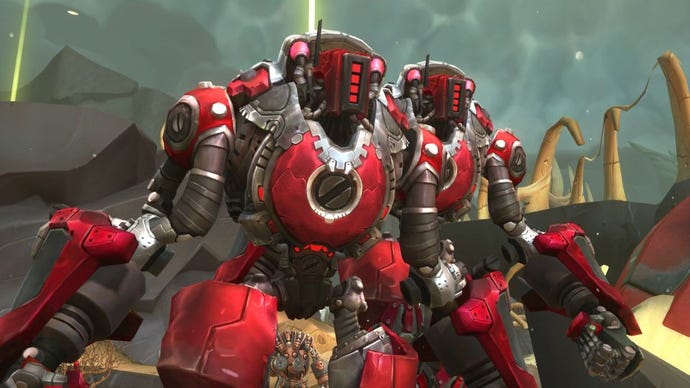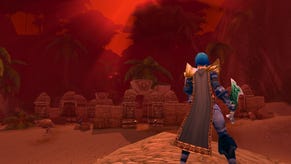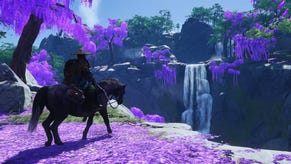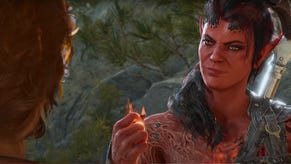WildStar: warplots, death maps and 71 pages of patch notes - interview
We speak with Carbine's executive producer Jeremy Gaffney about planning the long-term future of an MMO before it's even been released.
Carbine and NCsoft will publish WildStar in June - a new sci-fi MMO built by a team that has honed its skills on some of the standout hits of the genre. But regardless of past success, MMOs are a notoriously difficult market where players flirt with new releases only to return to the big time-consuming loves they've been loyal to for years.
While we went hands-on with WildStar last week to sample it before release, we also took some time to speak with Carbine's Jeremy Gaffney about where the developer intends to take the game post-release and how he hopes to keep it alive beyond the honeymoon period.
The staff at Carbine have great heritage and experience in the MMO market - Warhammer, Everquest, Warcraft, City of Heroes, Free Realms - all of which have had their time in the sun. What are the key things you've learnt from those games that you're applying to WildStar?
"We've been training ourselves to do monthly updates because we think the era of waiting 3-6 six months and then doing a big update is kind of over."
Jeremy Gaffney: There's stuff that's been done well before but we want to do it better. When stuff hasn't been done well or it's never been done we want to make sure we have a good mix of that. We don't want to completely reinvent wheels we don't need to, but also, we want to deliver something new, not something people have been playing for the past ten years.
All those games have all been successful, is there anything specific that you can take from those games and apply with a WildStar twist?
Jeremy Gaffney: Housing is an interesting one. Everquest 2 had a pretty good housing system but we wanted to make sure that it's really social, it's over-the-top, we build a world where you can do all sorts of crazy stuff. We have ferris wheels and mining nodes that modify the terrain - I don't think anyone has done that with their housing system before.
There has to be technical differences as well as gameplay differences. World of Warcraft did raiding better than anyone had done it before but with our action combat system we can make it fun and a challenge not just for the guys doing the damage. Everybody's got to react when this is going on. You can't really sit there as a Healer targeting spells. You've got to be dodging around, lining up heals - it needs to be a skill game. These are the sorts of things where even when people have done them really well before we want to take it up a notch. And some things are brand new. Nobody ever did Warplots before - build a giant death fortress. If that's in another game I have not played it.
Within reason, you're trying to remove as many restrictions as possible in order to the let the player go as wild as they want to - base building, customisation...
Jeremy Gaffney: I think that's a pretty true statement. We have a mantra to let players play how they want to play. We know the MMO market is made up of a couple of different types of players. Richard Bartle did research back in the days that said some people really love exploring and play games to hunt down the hidden things. Some people are socialisers. Some are all into achievement. So we took that and basically made the path system where you choose what type of thing you like to do and build the world around you.
"In the US and Europe around 65 percent of people play MMOs primarily as single-player games."
About 25 percent of the content is scavenger hunts, unlocking the map, or more combat for soldiers. That also applies to the fact that we know there are different brands of people for different leveling - some want to play entirely solo. In the US and Europe around 65 percent of people play MMOs primarily as single-player games. Are there fun things to do for people who like to solo, those who like PvE, those who like to kill their friends, PvP, do they like small group play or larger groups? You have to make sure you satisfy as many folk as possible without diluting the whole experience.
If you're trying to build something for everybody you have to focus on the great experiences, not the mediocre ones.
You're taking on a lot - a lot of player choice. But how do you balance that and enforce rules that will constrain some of the fun or some of the options to players?
Jeremy Gaffney: We've done it really by just throwing lots of really smart people at it. And then the secret to life in this business is you listen. We spend a lot of time hearing what our fans have to say, both in the game, through the forums and via social media. And we also mine a crap-load of data out of the game to discover things like where are the quit points? If you map every character who has not logged in for the last three weeks and put them on a big map in the office you'll see the hotspots - what is it about this dungeon or this area or battleground that's driving people out? We do that to tune the game and find things that don't work so we can either fix or pull out. We survey everybody to find out the best quests and the worst quests. When you log out we ask if you had fun, was the game's performance good, do you intend to buy the game? Fun is the number one most important thing to track.
We ask people to rate areas out of five and over 50 percent give a five and the next highest ranking is a four. So our mission in life isn't to stress over the 1 scores but work out how to get the fours up to fives.
This industry is giving so much access as to what the hell is going on in your world but often as a developer you're so busy trying to get the damn thing done that you don't have the luxury to do it scientifically.
"This industry is giving so much access as to what the hell is going on in your world but often as a developer you're so busy trying to get the damn thing done that you don't have the luxury to do it scientifically."
Since you've had the beta running has the game changed significantly or has the feedback been a refining process?
Jeremy Gaffney: The thing is we do huge changes every month. We've been training ourselves to do monthly updates because we think the era of waiting 3-6 six months and then doing a big update is kind of over. We've been training ourselves to do large updates every month. We're in tuning mode right now because we want to be fixing things. But still within that it's 71 pages of patch notes for last months' worth of work. But this is important. You not only want to fix the things that are important but we've set ourselves up to be churning out large amounts of content so there's new stuff for people to do, and we're also refining what's in there.
We've been doing that for the last six months although we haven't really publicised it too much as a thang because as we get closer people before launch want to have the game proven. As intelligent games designers you have to be thinking to the future. We are not a business where you go out and sell 100,000 boxes and you're done. We're a game where you hopefully attract millions of people but then the real question is how long are they going to stay? We've seen MMO after MMO that has moved 1, 2, 3 million boxes but how many of them keep those players for any length of time? That's really the challenge of our industry.
You say you've been doing monthly updates while WildStar is in beta - is that something you intend to continue once the game is live?
Jeremy Gaffney: Yes. Really the goal is as frequently as possible. If we can get that down to two weeks we'll do it. We've actually mapped out and we have pre-production done on the first 16 monthly updates. That sounds mildly insane but we just walked through them as a group the other day. Some are quests that need art but there's a significant amount of work that's been put into a year-plus into the future, so that we can make sure we can hit that. This past month had 71 pages of patch notes and some of that has been worked on for months in advance. If you're making a new dungeon or a new raid you better have a concept artist working on that. It's a process that can take a year. If you hear of someone coming out as an MMO who doesn't have a really damn good idea of what their next years' worth of content is, it means they're not going to have much of it.
If you're so far advanced with forward planning how do you respond to players reactively? People play differently and their taste changes very quickly. With an MMO it takes a long time to build the game, so how flexible can that next 16-month schedule be after the game is live, when it can become a different game once it's in the real world?
"We're not after no player deaths, we like player deaths. We just want them where we intend the death to be."
Jeremy Gaffney: Half the team is devoted to doing long-term content - literally half - working on mapping out content and advancing the world story for us. And half the team is in reactive mode where they're in reserve to tackle what needs to be tackled on a monthly basis, such as dealing with an economy issue that needs to be fixed. Or looking up at our death map on the wall and seeing that 200 percent more people die in this zone compared to the others so it needs retuning, or there's an area of the map where people are quitting frequently so we need to focus on that specifically - is it too boring or grindy? So we have a split team either reacting in real-time or mapping out for the long haul.
Tell me about the death map - is that for tracking every player death, reason, location?
Jeremy Gaffney: We generate heat maps every week to figure out where players are dying most. We're not after no player deaths, we like player deaths. We just want them where we intend the death to be. We map out where players die, where they quit, where bug reports come in. One of the most useful things from player bug reports is that they're adding into the player data for the big maps - is it something that's visual that players are reporting or is it very annoying and interrupting play? Our QA teams then dig in and solve the problems.
WildStar is currently in beta. Keep an eye on VG247 for invites to the beta. The game is due for release in June.














.jpg?width=291&height=164&fit=crop&quality=80&format=jpg&auto=webp)
